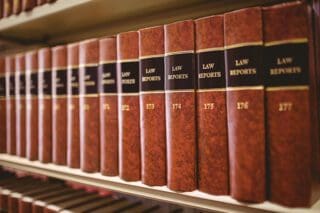
A deposition is a type of pre-trial testimony. It involves lawyers asking questions to witnesses who are relevant to a particular case. Lawyers in an asbestos case will want to depose people with knowledge about how the plaintiff developed mesothelioma. Depositions are part of the discovery process where parties gather information in preparation for a trial. They help the plaintiff’s and the defendant’s teams learn all the facts of a case.
Mesothelioma depositions are an important part of successful lawsuits. As such, a deposition can be stressful for witnesses unsure of how the process works. Learning about depositions ahead of time can help set expectations and manage stress.
Mesothelioma Deposition Overview
It may be helpful for interested parties to know who may be called as a witness for a deposition and what the deposition process consists of.
Anyone with information relevant to a particular asbestos case may be deposed. This includes:
- Mesothelioma victim plaintiffs
- Family members
- Friends
- Co-workers
- Doctors
Witnesses will receive a notification that they are to be deposed. They will have a say in when the deposition will occur. For example, opposing counsel should not expect a mesothelioma victim to be available at the same time they have a medical appointment.
Leading up to a deposition, a witness will prepare with their attorney. A mesothelioma lawyer will go into detail about the rules of a deposition and what types of questions may be asked. They will also go over the facts of the case and answer any questions a witness may have.
Present on the day of the deposition will be the witness, the attorneys for all interested parties, a person qualified to administer oaths and a stenographer to take a transcript. The witness’s attorney will be with them but cannot coach their client during the deposition.
The deposition may be taped. A witness will know in advance if there will be a video recording.
At trial, a legal team is generally not allowed to use a deposition as evidence. Depositions generally serve as a basis to uncover evidence appropriate for a trial setting. However, certain exceptions exist. An attorney may use a deposition to establish a contradiction in a witness’s testimony, when witnesses are unavailable at trial and in certain other instances.
Tips for a Successful Deposition
It is understandable that a witness might feel nervous leading up to their testimony. Below are a few tips to help witnesses avoid stress as they prepare for a deposition.
Your Attorney Is Your Best Resource
In the lead up to a deposition, an experienced mesothelioma attorney will be there to help strategize and answer any and all questions their client has. A witness should be honest with their attorney and feel free to ask them any questions. The attorney is there to advocate for their client’s interests and will help their client present themselves in the best light possible.
Always Tell the Truth
It is very important that witnesses tell the truth at a deposition. A witness in a deposition is answering questions under oath. This means there may be penalties if they are caught lying. Attorneys will often ask questions they already know the answer to. They may immediately know if a statement is false.
Don’t Engage in Guesswork
Part of telling the truth at a mesothelioma deposition requires witnesses to be honest about what they do and do not know. A person being deposed should not speculate or guess about a person’s asbestos exposure and medical history. If a witness does not know an answer to a question, they should say so. It is normal for a witness to not have perfect knowledge of the facts and events of an asbestos case.
If a question is confusing or unclear, a witness is free to ask for clarification or to have the attorney rephrase the question.
Experienced Mesothelioma Law Firms Exist to Help Witnesses Prepare for Depositions
Depositions are an important part of any lawsuit. Successful depositions may lead to a favorable settlement, may help uncover evidence useful to a mesothelioma plaintiff’s lawsuit and/or lead to a verdict for the victim at trial. An experienced mesothelioma law firm can help manage expectations and make the entire process less stressful.



